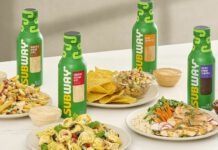TORONTO — On day three of RC Show 2021, the Speaker Stage kicked off the morning with the fast-casual installment of its CEO Panel series.
The discussion, hosted by Alexandra Gill, freelance restaurant critic, Globe and Mail, featured Alan Bekerman, founder & CEO, iQ FOOD CO.; Bruce Miller, president, The WORKS Craft Burgers & Beer, South St Burger, Big Smoke Burger & Tosto Quickfire Pizza & Pasta, MTY Food Group; and Scott Boatwright, Chief Restaurant Officer, Chipotle. The leaders discussed how they transformed their operations and menus during the pandemic, as well as plans for continued momentum.
As Miller pointed out, the roller-coaster of regulations and public-health orders (particularly in Ontario) meant The WORKS changed its business model “six times in the last year,” as well as significant staffing challenges.
Beckerman’s Toronto-based brand faced similar challenges. He noted iQ laid off 95 per cent of its staff in March 2020 and has now recovered between 60 and 65 per cent of its workforce. And, as iQ continues to weather the pandemic, Beckerman said, “You have to be laser focused about when it makes sense to be open and when it doesn’t and [we’ve been] simplifying our menus, which I think is a trend you’ve seen industry wide…The operator in everyone has really come out in the pandemic, because you’re minding every single detail of your business.”
When asked about how the pandemic impacted locations differently, panelists highlighted the impact the last year has had on downtown, urban locations. “That shift has really changed how we deliver the [brand] experience in the suburban markets and how we think about urban markets going forward,” said Boatwright, pointing to the challenging cycle of closing and re-opening urban food-court locations in particular. “But, our suburban restaurants out on the outskirts of the cities did really well through the pandemic.”
“If there’s only 10-per-cent occupancy in an [office] building, you’re kind of limited to that — and that is [our] audience in many cases,” shared Beckerman. “We don’t see folks coming back to offices in any real meaningful way until the spring of next year — at least in Canada, or Toronto specifically. So, we took the long view and said we just have to be patient and kind of ready ourselves for that 12 months of significantly lower volumes.” He explains iQ chose to stay open in these locations while many others opted to close “because we do really want to win back every single guest, one at a time, and introduce our brand to a lot of new faces.” And, he added, “Given that we are one of only a handful of spots open, it’s actually served as an opportunity to build back up our customer base with new faces, which has been interesting.”
Miller also noted that the government-employee and suburban markets have seen slight year-over-year sales increases. “But our tourist-driven areas, like downtown Toronto, Niagara Falls [and] downtown Hamilton, they’re incredibly hard hit…So, in those cases, we saw double-digit declines.”
The panelists agreed that their brands’ existing focus on off-premise occasions benefitted them during the pandemic, but it’s important to continue adapting and working on translating the full restaurant experience to takeout and delivery. “There is a certain kind of experience and feeling you get when you walk into a restaurant,” said Bekerman. “So we try to take small slivers of that experience and transport it to the delivery experience.” He pointed to playlists, hand-written thank-you notes and guests’ names written on takeout bags as examples. “It’s little things like that that really communicate that [we] care and that the brand stands for more than just the transaction.”


















